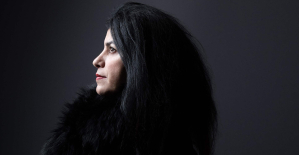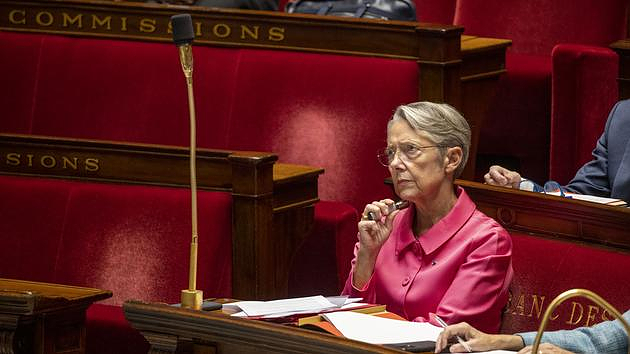This Monday morning, the surroundings of the National Assembly take on the appearance of a Council of Ministers. While Olivier Véran, visibly in a hurry, jumps into a taxi, his former colleague Clément Beaune leaves his new office, at 101, rue de l’Université, small briefcase in hand. A little further, at Café Concorde, Olivier Dussopt chats with journalists. Excluded from the government on Thursday, following the reshuffle, the three former ministers became deputies again. You'll have to get used to it.
Like them, six other former members of the government, including Élisabeth Borne, joined this Tuesday the benches of Macronist groups in need of heavyweights - Renaissance, Democratic Movement (MoDem) and Horizons. Everyone was summoned on Monday to complete administrative formalities, before participating in questions to the government on Tuesday, on the other side of the microphone. In the evening, they are invited to Matignon, with all the Macronist deputies. Nine out of 233 others.
In addition to a feeling of relegation, is there a risk of weariness overtaking these newcomers? Élisabeth Borne promised to “go to the end of (her) mandate” and to be “a full-time deputy” when she returned on Thursday to her voters in Condé-sur-Noireau (Calvados). “I want to hold my seat,” she told relatives. Privately, other former members of the executive power do not guarantee systematic attendance. “I’m not sure I’ll be the most present during the night sessions. But when the situation is tense, I will be there,” confesses one of them, while a second does not rule out resigning: “If I have an opportunity elsewhere, why not?”
During the interminable wait for the reshuffle, many hoped to be reappointed. “It’s a huge disappointment, but it’s a form of rediscovered freedom,” says the former Minister for Overseas Territories, Philippe Vigier, back on the Bonneval market (Eure-et-Loir), Monday . “It’s like going back to school in an establishment that you already know,” smiles former Minister of Labor Olivier Dussopt, MP since 2007.
Thanked by Emmanuel Macron on January 8, Élisabeth Borne has been preparing her arrival for more than a month. After spending a few days off in Morocco, she had lunch last week with the President of the Assembly, Yaël Braun-Pivet, who detected “serenity” and “desire” in her. She reconnected with the head of the Renaissance group, Sylvain Maillard, deputies and former ministers, such as Gérald Darmanin. Between the two, relations seem calmer. The Minister of the Interior even appreciated his last intervention in the courtyard of Matignon, “a beautiful speech for the children of the working classes”, in his eyes.
For her first elective mandate, the Calvados MP inherits a magnificent office at the Hôtel de Broglie, near the National Assembly. A place occupied until now by his substitute, Freddy Sertin, in anticipation of his potential return. In the Hemicycle, the former tenant of Matignon will sit in the former place of former minister Barbara Pompili. Central and close to members of the executive.
His former ministers will also be well placed, thanks to a game of musical chairs: Clément Beaune in place of Marie Lebec (Relations with Parliament) and Olivier Dussopt in place of Marie Guévenoux (Overseas), who entered the government. They will not be in the last row, unlike most of their alternates before.
Some “returners” have also made sure not to sit on the side of the left benches, from which they fear the jeers. “I can’t blame the rebels,” one of them gets annoyed in advance. They will surely organize a welcoming committee for us.” In the game of choosing commissions, the former prime minister opted for the prestige of foreign affairs. Its president, Jean-Louis Bourlanges, says he is “very flattered to receive her as a resident”, alongside Olivier Véran. The former Minister for Transport and Secretary of State for European Affairs, Clément Beaune, would have liked to settle there too, but he had to join the Law Commission.
While the government has become right-wing, the parliamentary majority sees its left wing strengthened. The arrival of Élisabeth Borne and the ex-socialists Olivier Dussopt, Clément Beaune and Olivier Véran gave rise among some of their peers to the desire to better structure themselves, perhaps into a distinct group. “At this stage, the creation of a separate group is not on the agenda,” assures former minister Nadia Hai, a figure of the Macronist left wing.
Élisabeth Borne herself insisted on Thursday: “The unity of the majority is essential.” “Some would dream of it, but she doesn’t want to label herself on the left,” assures one of her recent interlocutors. Which does not prevent other ex-ministers from organizing. In a recent message to the members of his party, Territoires de Progress, Olivier Dussopt recognizes a “global feeling of imbalance, even hemiplegia”. Understand: a shift to the right of the government. Vigilant, he warns: “We will have to discuss it together, debate it, to see what lessons we can learn from it.”

 Austria: incestuous torturer Josef Fritzl, nicknamed the “national monster”, could soon be released
Austria: incestuous torturer Josef Fritzl, nicknamed the “national monster”, could soon be released An airline continues to treat a centenarian as a one-year-old baby
An airline continues to treat a centenarian as a one-year-old baby Germany: the trial of nine “Citizens of the Reich” conspirators begins this Monday
Germany: the trial of nine “Citizens of the Reich” conspirators begins this Monday United Kingdom: David Cameron under fire after renting a jet estimated at 42 million pounds
United Kingdom: David Cameron under fire after renting a jet estimated at 42 million pounds Sánchez cancels his agenda and considers resigning: "I need to stop and reflect"
Sánchez cancels his agenda and considers resigning: "I need to stop and reflect" The Federal Committee of the PSOE interrupts the event to take to the streets with the militants
The Federal Committee of the PSOE interrupts the event to take to the streets with the militants Repsol: "We want to lead generative AI to guarantee its benefits and avoid risks"
Repsol: "We want to lead generative AI to guarantee its benefits and avoid risks" Osteoarthritis: an innovation to improve its management
Osteoarthritis: an innovation to improve its management Closure of the A13: would it really be possible to make the A14 free?
Closure of the A13: would it really be possible to make the A14 free? Surprise retirement of HSBC chief executive Noel Quinn
Surprise retirement of HSBC chief executive Noel Quinn Fight against disinformation: Brussels puts pressure on Facebook and Instagram as the European elections approach
Fight against disinformation: Brussels puts pressure on Facebook and Instagram as the European elections approach McDonald's results still suffer from boycott linked to the war in Gaza
McDonald's results still suffer from boycott linked to the war in Gaza The Musée du Grand Siècle in Saint-Cloud, this 100 million euro project in Hauts-de-Seine which would weaken the A13
The Musée du Grand Siècle in Saint-Cloud, this 100 million euro project in Hauts-de-Seine which would weaken the A13 Marjane Satrapi distinguished by the Princess of Asturias Foundation
Marjane Satrapi distinguished by the Princess of Asturias Foundation Royal Enfield Shotgun, 'custom' attitude from Monday to Sunday
Royal Enfield Shotgun, 'custom' attitude from Monday to Sunday End of the legal battle between Britney Spears and her father
End of the legal battle between Britney Spears and her father Omoda 7, another Chinese car that could be manufactured in Spain
Omoda 7, another Chinese car that could be manufactured in Spain BYD chooses CA Auto Bank as financial partner in Spain
BYD chooses CA Auto Bank as financial partner in Spain Tesla and Baidu sign key agreement to boost development of autonomous driving
Tesla and Baidu sign key agreement to boost development of autonomous driving Skoda Kodiaq 2024: a 'beast' plug-in hybrid SUV
Skoda Kodiaq 2024: a 'beast' plug-in hybrid SUV The home mortgage firm rises 3.8% in February and the average interest moderates to 3.33%
The home mortgage firm rises 3.8% in February and the average interest moderates to 3.33% This is how housing prices have changed in Spain in the last decade
This is how housing prices have changed in Spain in the last decade The home mortgage firm drops 10% in January and interest soars to 3.46%
The home mortgage firm drops 10% in January and interest soars to 3.46% The jewel of the Rocío de Nagüeles urbanization: a dream villa in Marbella
The jewel of the Rocío de Nagüeles urbanization: a dream villa in Marbella Europeans: a senior official on the National Rally list
Europeans: a senior official on the National Rally list Blockade of Sciences Po: the right denounces a “drift”, the government charges the rebels
Blockade of Sciences Po: the right denounces a “drift”, the government charges the rebels Even on a mission for NATO, the Charles-de-Gaulle remains under French control, Lecornu responds to Mélenchon
Even on a mission for NATO, the Charles-de-Gaulle remains under French control, Lecornu responds to Mélenchon “Deadly Europe”, “economic decline”, immigration… What to remember from Emmanuel Macron’s speech at the Sorbonne
“Deadly Europe”, “economic decline”, immigration… What to remember from Emmanuel Macron’s speech at the Sorbonne These French cities that will boycott the World Cup in Qatar
These French cities that will boycott the World Cup in Qatar Premier League: Manchester United ready to sell the vast majority of its workforce
Premier League: Manchester United ready to sell the vast majority of its workforce Paris 2024 Olympics: when will Thierry Henry reveal the list of Olympic Blues?
Paris 2024 Olympics: when will Thierry Henry reveal the list of Olympic Blues? Rugby: Qatar's astronomical offer to host the biggest clashes between North and South
Rugby: Qatar's astronomical offer to host the biggest clashes between North and South OM-Atalanta Bergamo: at what time and on which channel to watch the Europa League semi-final first leg?
OM-Atalanta Bergamo: at what time and on which channel to watch the Europa League semi-final first leg?

















